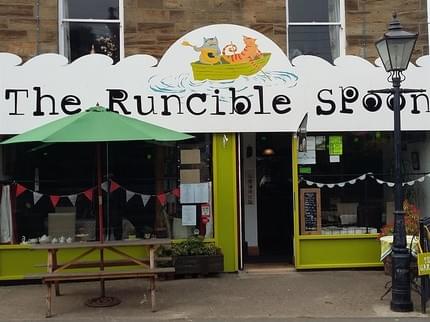Everybody knows The Owl and the Pussycat, the nonsense poem by Edward Lear. There’s no rule that impels its inclusion in the primary school curriculum; it is just one of those pieces of our culture that gets passed down and which everyone has heard by the time they’re ten. Perhaps by osmosis. Or more likely, its appeal to many a nursery school assistant charged with entertaining a roomful of children, due to its delicious use of language, rhyme, and imagery.
First published in 1871 as part of his book Nonsense Songs, Stories, Botany, and Alphabets, Lear wrote the poem for the daughter of a friend. And like that other great Victorian purveyor of nonsense verse, Lewis Carroll, Lear had that exquisite talent for choosing just the right made-up nonsense words. “Runcible”, for example, as in the phrase “which they ate with a runcible spoon”, was one such coinage, right up there with Lewis Carroll’s ‘galumphing’ and ‘frumious’ from Jabberwocky. Lear went on to use this wonderfully meaningless adjective to describe his hat, a wall, and even his cat. “The Runcible Spoon” would be a great name for a café, wouldn’t it? In fact, there already is one: I came across this in the village of Hinderwell, whilst on holiday in Runswick Bay:

But is ‘The Owl and the Pussycat’ meant to mean anything? Is it simply delightful fantasy with its owl and pussycat that can talk and sing songs, a pig that engages in financial transactions, and a turkey officiating at a wedding? Should we read anything into the fact that they have to sail the seas for a year and a day, travelling to the land of the Bong-Tree, in order to get a ring? Or is it making a commentary on Victorian society, subverting its norms and mores? I don’t think we need to know. Simply enjoy the vermonious use of words (vermonious? I just made it up, of course!).
The Owl and the Pussy-cat went to sea
In a beautiful pea-green boat,
They took some honey, and plenty of money,
Wrapped up in a five-pound note.
The Owl looked up to the stars above,
And sang to a small guitar,
“O lovely Pussy! O Pussy, my love,
What a beautiful Pussy you are,
You are,
You are!
What a beautiful Pussy you are!”
Pussy said to the Owl, “You elegant fowl!
How charmingly sweet you sing!
O let us be married! too long we have tarried:
But what shall we do for a ring?“
They sailed away, for a year and a day,
To the land where the Bong-Tree grows
And there in a wood a Piggy-wig stood
With a ring at the end of his nose,
His nose,
His nose,
With a ring at the end of his nose.
“Dear Pig, are you willing to sell for one shilling
Your ring?” Said the Piggy, “I will.“
So they took it away, and were married next day
By the Turkey who lives on the hill.
They dined on mince, and slices of quince,
Which they ate with a runcible spoon;
And hand in hand, on the edge of the sand,
They danced by the light of the moon,
The moon,
The moon,
They danced by the light of the moon.

Great Information.Thanks for sharing